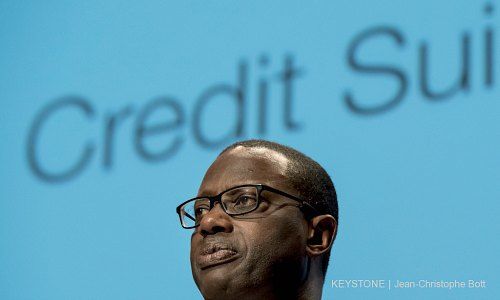After three years of Tidjane Thiam, Credit Suisse is considerably more stable, but shareholders have had little of the improvements. The big issue? The Swiss bank's still-big trading arm.
Credit Suisse CEO Tidjane Thiam faces the uphill task next Wednesday at an investor event in London of selling a sustainable story for the Swiss bank's shares. In the three years he has run Credit Suisse, the stock has largely been a disappointment for investors – despite improvements in the condition of the bank.
This year, after Credit Suisse's shares have lost 18 percent of their value so far, is no exception. The drop is softer than that of crisis case Deutsche Bank, but considerably sharper than UBS' fall.
Market Differs
Credit Suisse's first full-year net profit since 2014 (!) won't help Thiam much: the market trades his stock at a discount to book value. The bank's prospects are viewed as uncertain.
The reluctance comes after Credit Suisse has delivered incontrovertible proof that it can reap growth in both wealth and asset management, and beat peers in winning net new assets.
Growth Conundrum
Margin pressure is another story – and a trend that Credit Suisse, like other banks, is finding it harder to buck. The full sobering picture was apparent in the first quarter, when revenue not only didn't grow but retreated to levels last seen early in 2016.
Credit Suisse's problem, long before Thiam entered the scene, is its investment bank with a distinct emphasis on trading. Global markets, the product and trading arm led by Brian Chin, posted an after-tax loss last quarter.
Distance to Target
For Thiam, this translates to a reckoning with market perceptions which he will not agree with: the CEO is some distance from his target of changing Credit Suisse into a wealth manager with a client-focused investment bank, which together delivers more stable and predictable results.
What can Thiam do to gin up Credit Suisse's stock story? The bad news first: he is unlikely to further pare back the investment bank and in particular the volatile global markets segment further. The market would welcome this: the trading unit ties up valuable capital, and delivers low pre-tax profits which are especially vulnerable to market swings.
Flicking the Switch?
Thiam all but ruled out more pruning of the unit last month, arguing that the unit is too important for Credit Suisse's wealthy private clients. The second bit of bank news: Thiam of course cannot simply influence Credit Suisse's revenue at the flick of a switch.
- Page 1 of 2
- Next >>






















